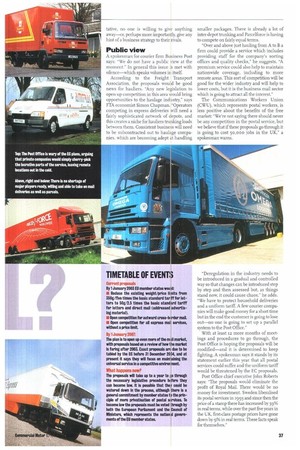p °sting a letter will never be the same after 2003
Page 38

Page 39

If you've noticed an error in this article please click here to report it so we can fix it.
if the European Commission gets its way. The Post Office has been arguing about the issue of privatisation with governments for years, but sweeping reforms via Brussels could bring a back-door revolution to the industry. Understandably, those who stand to lose their profits, jobs or both in the shake-up of services are not too happy. But there is no doubt that the opportunities are going to be there for franchise operators and the haulage industry, even if no one is keen to declare their interest publicly before it happens.
At present just 3% of the EU postal market
is open to competition. Under the new proposals, zo% would be available for private enterprise from 20°3, with reductions in current weight/price restrictions to 5og or 2.5 times the basic tariff for letters and advertising mailshots.
EU internal market commissioner Frits Bolkestein says: "Fast, efficient, competitive postal services are vital to ensure the competitiveness of EU industry." He adds that universal service will be safeguarded, but points out that in the electronic age businesses will want fast, affordable, efficient delivery—the implication being that without enough competition the service will not be good enough to match the technology.
The Post Office is not happy with this scenario. It claims that a 20% share of the current mail market is worth Ltoom over three years. More competition will simply allow other companies to pick up the lucrative business-to-business jobs. But it is this type of work that helps to subsidise the Post Office's flat-rate universal service to all parts of the country, including remote places that are expensive to service.
It is taken for granted that courier companies, such as TNT Express and Amtrak, are going to be looking at the profitable business market, rather than taking over from the local pestle and delivering the morning mail to people's homes. Securicor Omega Express is unlikely to be the role model for a new-style Postman Pat. But, with everything still so ten tative, no one is willing to give anything away—or, perhaps more importantly, give any hint of a business strategy to their rivals.
Public view
A spokesman for courier firm Business Post says: "We do riot have a public view at the moment" In general this issue met with silence—which speaks volumes in itself.
According to the Freight Transport Association, the proposals would be good news for hauliers. "Any new legislation to open up competition in this area would bring opportunities to the haulage industry," says FTA economist Simon Chapman. "Operators competing in express deliveries will need a fairly sophisticated network of depots, and this creates a niche for hauliers trunking loads between them. Consistent business will need to be subcontracted out to haulage companies, which are becoming adept at handling
smaller packages. There is already a. lot of inter-depot trunking and Parcelforce is having to compete on fairly equal terms.
"Over and above just hauling from A to B a firm could provide a service which includes providing staff for the company's sorting offices and quality checks," he suggests. "A premium service could also help to maintain nationwide coverage, including to more remote areas. This sort of competition will be good for the wider industry and will help to lower costs, but it is the business mail sector which is going to attract all the interest."
The Communications Workers Union (CWU), which represents postal workers, is less positive about the benefits of the free market "We're not saying there should never be any competition in the postal service, but we believe that if these proposals go through it is going to cost 5o,000 jobs in the UK," a spokesman warns.
"Deregulation in the industry needs to be introduced in a gradual and controlled way so that changes can be introduced step by step and then assessed but, as things stand now, it could cause chaos," he adds. "We have to protect household deliveries and a uniform tariff A few courier companies will make good money for a short time but in the end the customer is going to lose out—no one is going to set up a parallel system to the Post Office."
With at least iz more months of meetings and procedures to go through, the Post Office is hoping the proposals will be modified—and it is determined to keep fighting. A spokesman says it stands by its statement earlier this year that all postal services could suffer and the uniform tariff would be threatened by the EC proposals.
Post Office chief executive John Roberts says: "The proposals would eliminate the profit of Royal Mail. There would be no money for investment. Sweden liberalised its postal services in 1993 and since then the price of a stamp there has increased by 59% in real terms, while over the past five years in the UK, first-class postage prices have gone down by 9% in real terms. These facts speak for themselves."








































































































